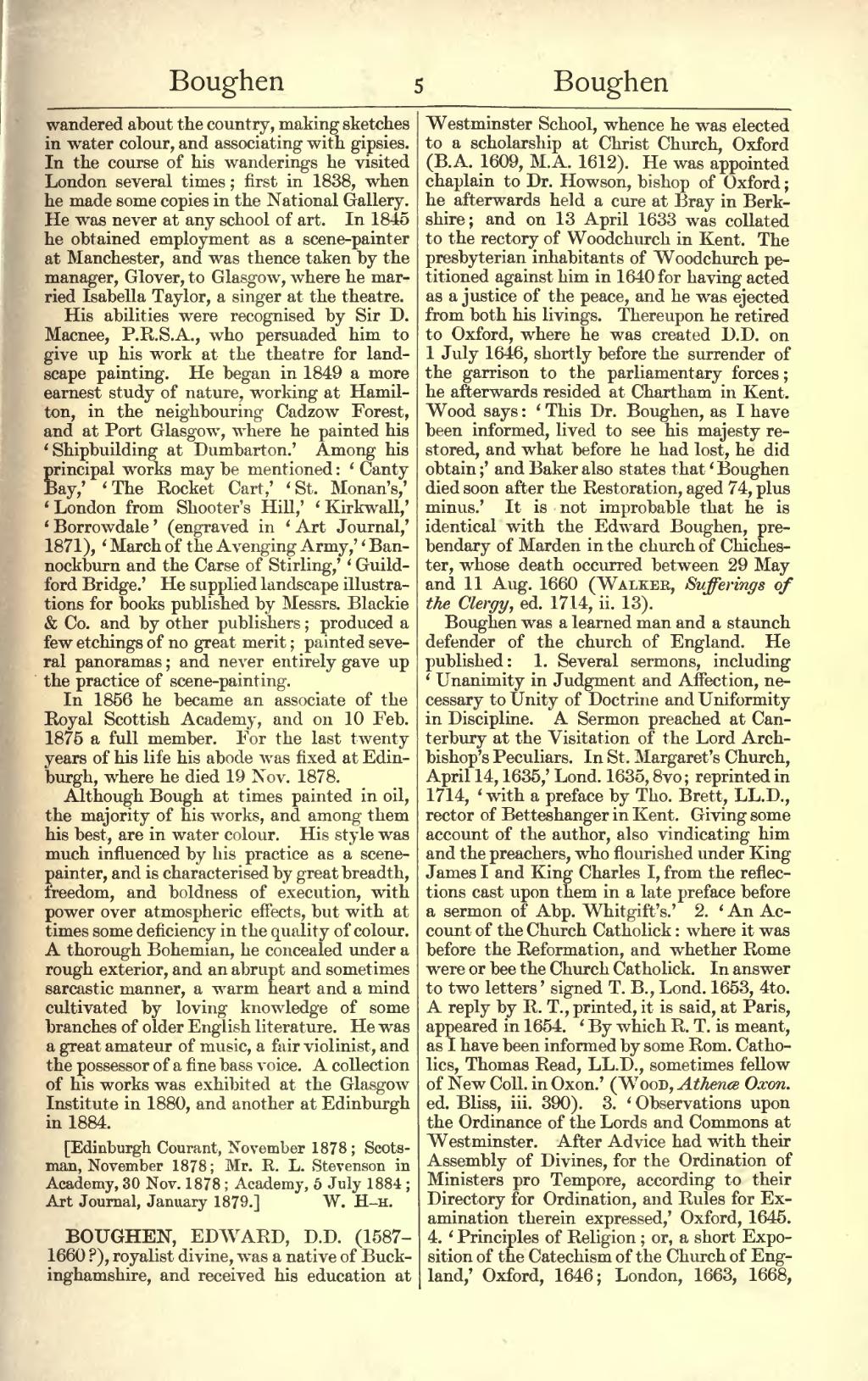wandered about the country, making sketches in water colour, and associating with gipsies. In the course of his wanderings he visited London several times; first in 1838, when he made some copies in the National Gallery. He was never at any school of art. In 1845 he obtained employment as a scene-painter at Manchester, and was thence taken by the manager, Glover, to Glasgow, where he married Isabella Taylor, a singer at the theatre.
His abilities were recognised by Sir D. Macnee, P.R.S.A., who persuaded him to give up his work at the theatre for landscape painting. He began in 1849 a more earnest study of nature, working at Hamilton, in the neighbouring Cadzow Forest, and at Port Glasgow, where he painted his 'Shipbuilding at Dumbarton.' Among his principal works may be mentioned: 'Canty Bay,' 'The Rocket Cart,' 'St. Monan's,' 'London from Shooter's Hill,' 'Kirkwall,' 'Borrowdale' (engraved in 'Art Journal,' 1871), 'March of the Avenging Army,' 'Bannockburn and the Carse of Stirling,' 'Guildford Bridge.' He supplied landscape illustrations for books published by Messrs. Blackie & Co. and by other publishers; produced a few etchings of no great merit; painted several panoramas; and never entirely gave up the practice of scene-painting.
In 1856 he became an associate of the Royal Scottish Academy, and on 10 Feb. 1875 a full member. For the last twenty years of his life his abode was fixed at Edinburgh, where he died 19 Nov. 1878.
Although Bough at times painted in oil, the majority of his works, and among them his best, are in water colour. His style was much influenced by his practice as a scene-painter, and is characterised by great breadth, freedom, and boldness of execution, with power over atmospheric effects, but with at times some deficiency in the quality of colour. A thorough Bohemian, he concealed under a rough exterior, and an abrupt and sometimes sarcastic manner, a warm heart and a mind cultivated by loving knowledge of some branches of older English literature. He was a great amateur of music, a fair violinist, and the possessor of a fine bass voice. A collection of his works was exhibited at the Glasgow Institute in 1880, and another at Edinburgh in 1884.
[Edinburgh Courant, November 1878; Scotsman, November 1878; Mr. R. L. Stevenson in Academy, 30 Nov. 1878; Academy, 5 July 1884; Art Journal, January 1879.]
BOUGHEN, EDWARD, D.D. (1587–1660?), royalist divine, was a native of Buckinghamshire, and received his education at Westminster School, whence he was elected to a scholarship at Christ Church, Oxford (B.A. 1609, M.A. 1612). He was appointed chaplain to Dr. Howson, bishop of Oxford; he afterwards held a cure at Bray in Berkshire; and on 13 April 1633 was collated to the rectory of Woodchurch in Kent. The presbyterian inhabitants of Woodchurch petitioned against him in 1640 for having acted as a justice of the peace, and he was ejected from both his livings. Thereupon he retired to Oxford, where he was created D.D. on 1 July 1646, shortly before the surrender of the garrison to the parliamentary forces; he afterwards resided at Chartham in Kent. Wood says: 'This Dr. Boughen, as I have been informed, lived to see his majesty restored, and what before he had lost, he did obtain;' and Baker also states that 'Boughen died soon after the Restoration, aged 74, plus minus.' It is not improbable that he is identical with the Edward Boughen, prebendary of Marden in the church of Chichester, whose death occurred between 29 May and 11 Aug. 1660 (Walker, Sufferings of the Clergy, ed. 1714, ii. 13).
Boughen was a learned man and a staunch defender of the church of England. He published:
- Several sermons, including 'Unanimity in Judgment and Affection, necessary to Unity of Doctrine and Uniformity in Discipline. A Sermon preached at Canterbury at the Visitation of the Lord Archbishop's Peculiars. In St. Margaret's Church, April 14, 1635,' Lond. 1635, 8vo; reprinted in 1714, 'with a preface by Tho. Brett, LL.D., rector of Betteshanger in Kent. Giving some account of the author, also vindicating him and the preachers, who flourished under King James I and King Charles I, from the reflections cast upon them in a late preface before a sermon of Abp. Whitgift's.'
- 'An Account of the Church Catholick: where it was before the Reformation, and whether Rome were or bee the Church Catholick. In answer to two letters' signed T. B., Lond. 1653, 4to. A reply by R. T., printed, it is said, at Paris, appeared in 1654. 'By which R. T. is meant, as I have been informed by some Rom. Catholics, Thomas Read, LL.D., sometimes fellow of New Coll. in Oxon.' (Wood, Athenæ Oxon. ed. Bliss, iii. 390).
- 'Observations upon the Ordinance of the Lords and Commons at Westminster. After Advice had with their Assembly of Divines, for the Ordination of Ministers pro Tempore, according to their Directory for Ordination, and Rules for Examination therein expressed,' Oxford, 1645.
- 4. 'Principles of Religion; or, a short Exposition of the Catechism of the Church of England,' Oxford, 1646; London, 1663, 1668,
